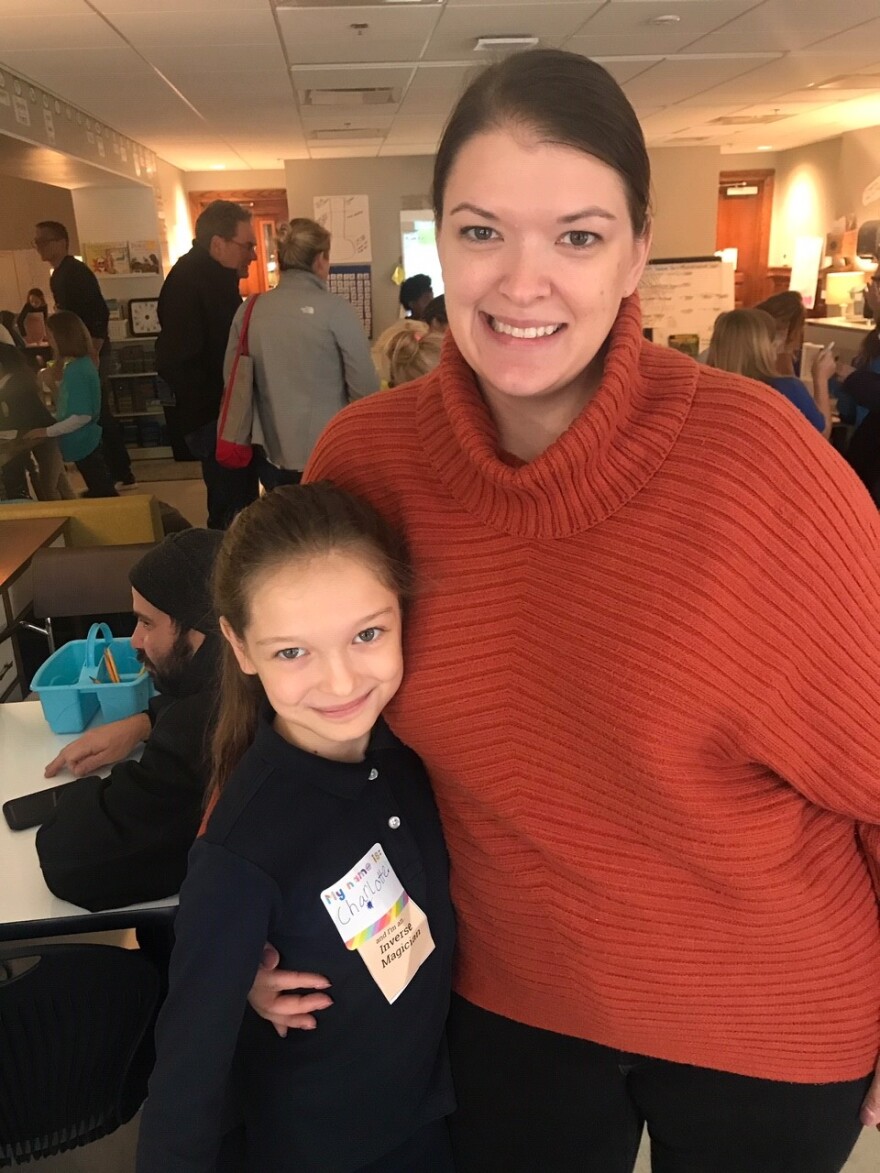Like a lot of Kansas City parents with young kids, Alyssa Rogers has been trying to work from home without child care throughout the pandemic.
But the last several weeks have been especially challenging for Rogers and her husband, Burt, because they’re both therapists who need to maintain confidentiality with their patients while doing telehealth.
“Part of therapy is being present and monitoring how your client is doing, and we’re already ... trying to read things like body language through the computer or sometimes just through audio,” Rogers said. “Having kids in the room would not be ethical.”
So whoever’s working gets the basement office, and Rogers and her husband take turns watching 6-year-old Maya and 2-year-old Jasmine upstairs. It’s only sort of working. Over the last two weeks, Rogers was only able to log 53 of the 80 hours she’d usually work as a school-based therapist for Belton students.
Now, as Kansas City plans to reopen, Rogers isn’t sure what her family will do.

“Is my school district going to do summer school? Is Maya’s?” Rogers wondered. She’s also not sure when Jasmine’s child care will reopen, or if she’d even be comfortable sending her daughter there when it does.
“My coworkers and I have been asking each other ... if people have kids and don’t have child care ... ”
Rogers trailed off because for working parents, there are no easy answers right now.
Uncertainty for providers, too
Last week, Missouri Gov. Mike Parson announced the state is receiving $66 million in federal child care assistance, which will help low-income families looking for work. But when he was asked what parents should do if they don’t feel it’s safe to put their kids back in child care yet, Parson said that was their choice.
“Parents need to take that responsibility,” Parson said. “I’m not sure why any of us would ever put our children in harm’s way if we knew there was an alternative, even if that means staying at home with them.”
Not all families have the choice to stay home, though. Robin Phillips, the CEO of the St. Louis-based Child Care Aware of Missouri, said anymore, it’s a luxury most families can’t afford.
“I get frustrated when I’m told, ‘You know, Mama should be at home.’ It’s 2020. There are more women in the workforce than there ever have been,” she said.
Phillips and other advocates consider child care critical infrastructure, but policymakers don’t fund child care like they do things like roads.
In Missouri and Kansas, the vast majority of providers are women watching children in their homes, operating on razor-thin margins. Nationally, nearly a third of providers surveyed by the National Association for the Education of Young Children said they would not be able to survive a closure of more than two weeks without significant public investment.
In late April, five weeks into the pandemic, 46% of metro Missouri providers and 16% of metro Kansas providers were closed, according to the Mid-America Regional Council.
Attendance is down at centers that have remained open to care for the children of essential workers. Providers continuing to operate during the pandemic have struggled to get toilet paper, disinfecting wipes and even diapers.
MARC has been trying to solve some of those supply chain issues for child care providers.
“Instead of a provider having to drive around to five different grocery stores or Targets or Walmarts because supplies were being limited on how many you could purchase at one time, we really looked at how to do some collective resource gathering,” said Paula Neth, CEO of the Family Conservancy, a Kansas City, Kansas-based nonprofit that supports early childhood initiatives.
Still, there will be child care providers who don’t reopen right away because they aren’t sure how to do so safely. There are resources out there – Neth likes Child Care Aware of America’s health and safety guide – but the entire profession is grappling with existential questions right now.
“So much of the early childhood world is teaching social emotional skills,” said Craig Stevenson of Kids Win Missouri, a child well-being organization. “So what are the ramifications of me wearing a mask? Will the child be fearful? As an adult, how can I teach a child about being sad and being happy with a mask?”
Stevenson and his wife have a 20-month-old son who they’ve kept in child care throughout the pandemic. But they also live in Boone County in mid-Missouri, where COVID-19 isn’t spreading as quickly.
Burden falling mostly on mothers
Kansas City parents Lauren Bakian Aaker and her husband haven’t decided if their 2-year-old daughter is going back to Union Hill Day School when it reopens next week.
They want her to go back so that she can be with kids her own age, developing the social skills she’ll need to go to preschool in the fall. “But the other side of that is if we’re sending her to day care, then that really means we’re not going to see the grandparents for a while because we don’t want to put them at risk,” said Bakian Aaker, who also has a newborn and a 4-year-old.
Bakian Aaker’s father frequently helps watch her kids, but many of the parents KCUR spoke to said they were worried about asking grandparents to provide child care when 80% of COVID-19 deaths in the United States have been older adults.
But working from home with little kids isn’t ideal, either. Bakian Aaker teaches fifth graders at Hale Cook Elementary in Kansas City Public Schools, and her husband, Joe, is a lawyer. He had planned to take paternity leave this spring to take care of their 3-month old son but hasn’t been able to because of the pandemic.
At first, Bakian Aaker tried to keep up with all the educational activities her oldest daughter’s preschool teachers recommended. But she eventually had to stop doing that so she could be present for the students she was teaching.

Women disproportionately report that it is their job to sort out child care and schooling. In a survey of 1,500 parents, 78% of partnered mothers told the national nonprofit ParentsTogether that distance learning during the pandemic has been their responsibility.
Erin Kelley said because her husband is frequently on conference calls, it’s usually her who watches their nine-year-old daughter Charlotte. Kelley says Charlotte can work independently for a while, but sometimes it’s for an hour and other times it’s for 15 minutes.
“She needs me close by in case she has a question or in case she doesn’t understand something, and as soon as the task is done, she wants to know what’s next,” Kelley said.
Normally, Kelley would be working from 9 a.m. to 3 p.m. in an office doing events and marketing for the Brookside Business Association and the Southtown Council.
“I tried to make my workday fit her school day, but still, she was somewhere while I was working,” Kelley said. “She wasn’t right next to me doing school.”
Single mom Christy Moreno is also struggling to teach her children while holding down a demanding job as a corporate executive in the Kansas City metro.
Moreno’s daughter, 13-year-old Nina, doesn’t need much help with her schoolwork, but 10-year-old Emilio does.
“I’ve been having to re-learn fourth grade trigonometry, which I was never really great to begin with, and the way our children are being taught is completely different from what it was 30 years ago,” Moreno said.
Moreno’s first language is Spanish, and she often volunteers to translate for limited English proficiency families. She says as frustrated as she gets sometimes, she knows it’s much worse for a friend who until recently worked in housekeeping at a downtown hotel.
“Not only is that family suffering financially, but she doesn’t have the tools she needs to be able to help her children do online learning,” Moreno said.
No summertime break
Right now, Moreno is trying to figure out what summer will look like without the Kansas City Parks and Recreation camps they usually attend. Some of those camps will be operating this summer, but because Emilio has severe asthma, he’s at high risk for COVID-19.
So Moreno is keeping him home. She’s trying to prepare herself for the possibility for several more months of distance learning in case schools can’t reopen in August.
“If this is a long-term situation, how as a mother am I going to provide the things they’re not having anymore, like extracurriculars or their social experiences?” she said.

Kelley is also worried about the impact weeks of isolation has had on her daughter, Charlotte – Zoom classes, she says, aren’t enough for a social child who misses her friends. Kelley expects tears when she has to tell her daughter there will be no pool time this summer and no trips to see grandma.
“We’ve always come up with some calendar full of camps, grandma time, a collaboration of playdates with friends where I front-load my work week and a friend back-loads hers so we can share care,” Kelley said. “But we’re just not comfortable doing that this summer.”
Annie Watson is a senior associate at School Readiness Consulting, which she describes as a social justice organization that focuses on early childhood education. In 2019, she worked on the campaign to pass a sales tax to pay for pre-K in Kansas City, Missouri, that voters ultimately rejected. She has four kids of her own.
“We’re getting a lot of mixed messages as parents, as mothers, as primary keepers of young children, about what is safe and what is not safe,” Watson said. “You can see all the different decisions families are making just by driving around town right now. But I think it’s a faulty notion to assume that just because child care is available families will automatically return.”
But at the same time, she said, families who need to go back to work to earn income will be under intense pressure to do so as soon as child care is available again.






